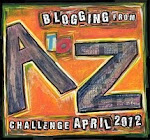K Is for Knowledge
A couple of days ago, I talked about ignorance. That post ended with a reference to knowledge, touching on the intersection of player knowledge and character knowledge. In the wonderful world of Venn diagrams, player knowledge and character knowledge obviously cannot be kept completely separate. Permit me to bust out my minimal skills as a computer artist:

When playing a roleplaying game, one aid to the laudable goal of staying in character is maintaining the distinctions between player knowledge and character knowledge as much as possible. As a most basic example, a player, when speaking in-character, should avoid specific reference to game mechanics. The character does not know he is fictitious. The character, insofar as the game is an exercise is interactive creative fiction, thinks he’s a real person in a real world.
Torina the Paladin would never ask, “How many hit points do you have left?” Hit points are a game mechanic, not a real measure of health. A couple of years ago, I fell and split my elbow open to the bursa. If the doctor had said, “Wow, that looks like it did at least six hit points of damage to you!”, and he wasn’t making some sort of gamer joke, I’d have just cause to question that doctor’s competence. Like Pinocchio at the end of the story, I’m a real boy. I don’t have hit points. Likewise, Torina qua Torina wouldn’t think of injuries in terms of a temporary depletion of a point-measured character resource.
The player, on the other hand, knows all sorts of things about the game and his character that the character does not know. The player, for example, probably knows that skeletons have damage reduction against all but bludgeoning weapons. This does not mean, however, that the player’s character necessarily knows that fact.
Torina the Paladin, at 1st-level, never having before encountered an undead skeleton, might know about the monster’s resistance to her longsword. If she does, it is not because the player knows. Rather, Torina may know about the skeleton’s resistance due to a successful Knowledge (religion) check or because the GM decides that this particular undead fact is part of the campaign background information, possibly related to Torina’s pre-adventurer history. Otherwise, Torina must acquire knowledge of the skeleton’s damage resistance through direct experience (e.g., attacking with her longsword and seeing it do less damage) or from a second-hand source (e.g., the party’s cleric, who makes a Knowledge check).
Maintaining the distinction between what the player knows and what the character knows means, at least some of the time, that a player must roleplay his character’s ignorance, even when (especially when?) doing so puts the character at a disadvantage.
There’s a flip side to distinction maintenance. The GM has the responsibility to inform the players of those things that the characters know but the players don’t know. I bump into this fairly often during my current campaign, which I’m most sort of making up as I go along. The characters lived in the new campaign region for a few months before gameplay in that region actually began. Two players brought in new characters, who are both natives to the region. When the players ask for background information, I must take into consideration what the characters could have reasonably learned during that time not actually depicted in gameplay.
A further aspect requires the GM to keep distinct those things he knows about the players’ characters and those things that the monsters and NPCs the characters meet could know. Bad guys who’ve no knowledge of the characters should not be able to act upon knowledge of the characters’ abilities and tactics ahead of time. After the fact, surviving bad guys might be able to adjust their tactics, as my players discovered when they encountered dromite knights packing a few scrolls of dispel magic in order to counter the characters’ reliance on entangle spells.
(Unfortunately for the knights, these preparations availed them nought. The characters launched a well-planned ambush, and managed to foil the would-be scroll-users.)
What an acceptable level of distinction between player knowledge and character knowledge looks like in your campaign is a conversation worth having within your gaming group. To the extent that everyone maintains whatever that level is, the quality of your game is likely to improve.

